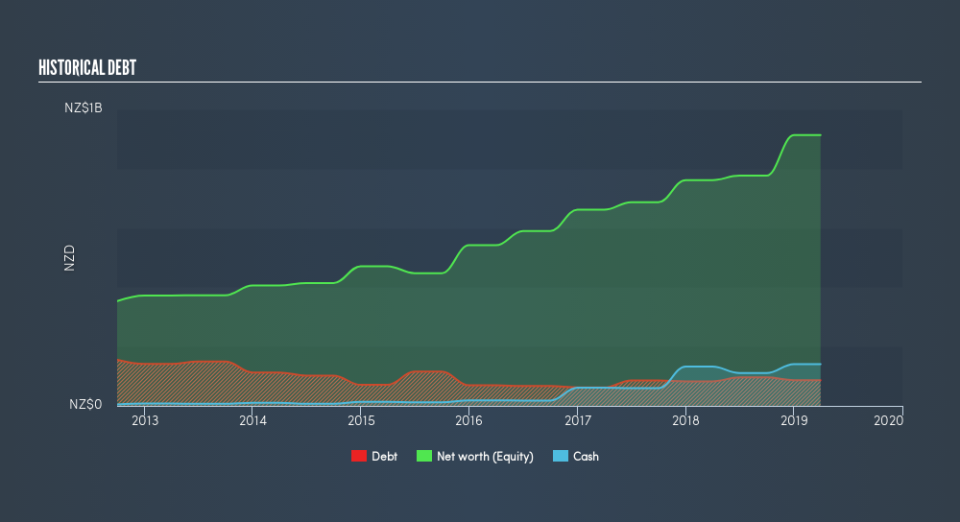Fisher & Paykel Healthcare (NZSE:FPH) Has A Pretty Healthy Balance Sheet

Some say volatility, rather than debt, is the best way to think about risk as an investor, but Warren Buffett famously said that 'Volatility is far from synonymous with risk.' When we think about how risky a company is, we always like to look at its use of debt, since debt overload can lead to ruin. As with many other companies Fisher & Paykel Healthcare Corporation Limited (NZSE:FPH) makes use of debt. But the real question is whether this debt is making the company risky.
Why Does Debt Bring Risk?
Debt is a tool to help businesses grow, but if a business is incapable of paying off its lenders, then it exists at their mercy. Part and parcel of capitalism is the process of 'creative destruction' where failed businesses are mercilessly liquidated by their bankers. While that is not too common, we often do see indebted companies permanently diluting shareholders because lenders force them to raise capital at a distressed price. Having said that, the most common situation is where a company manages its debt reasonably well - and to its own advantage. When we examine debt levels, we first consider both cash and debt levels, together.
See our latest analysis for Fisher & Paykel Healthcare
What Is Fisher & Paykel Healthcare's Net Debt?
The image below, which you can click on for greater detail, shows that at March 2019 Fisher & Paykel Healthcare had debt of NZ$86.8m, up from NZ$82.7m in one year. However, its balance sheet shows it holds NZ$140.9m in cash, so it actually has NZ$54.1m net cash.
How Healthy Is Fisher & Paykel Healthcare's Balance Sheet?
According to the last reported balance sheet, Fisher & Paykel Healthcare had liabilities of NZ$184.4m due within 12 months, and liabilities of NZ$109.1m due beyond 12 months. Offsetting these obligations, it had cash of NZ$140.9m as well as receivables valued at NZ$159.3m due within 12 months. So it actually has NZ$6.70m more liquid assets than total liabilities.
This state of affairs indicates that Fisher & Paykel Healthcare's balance sheet looks quite solid, as its total liabilities are just about equal to its liquid assets. So while it's hard to imagine that the NZ$9.07b company is struggling for cash, we still think it's worth monitoring its balance sheet. Succinctly put, Fisher & Paykel Healthcare boasts net cash, so it's fair to say it does not have a heavy debt load!
The good news is that Fisher & Paykel Healthcare has increased its EBIT by 8.5% over twelve months, which should ease any concerns about debt repayment. The balance sheet is clearly the area to focus on when you are analysing debt. But ultimately the future profitability of the business will decide if Fisher & Paykel Healthcare can strengthen its balance sheet over time. So if you're focused on the future you can check out this free report showing analyst profit forecasts.
Finally, a company can only pay off debt with cold hard cash, not accounting profits. While Fisher & Paykel Healthcare has net cash on its balance sheet, it's still worth taking a look at its ability to convert earnings before interest and tax (EBIT) to free cash flow, to help us understand how quickly it is building (or eroding) that cash balance. Looking at the most recent three years, Fisher & Paykel Healthcare recorded free cash flow of 50% of its EBIT, which is weaker than we'd expect. That weak cash conversion makes it more difficult to handle indebtedness.
Summing up
While we empathize with investors who find debt concerning, you should keep in mind that Fisher & Paykel Healthcare has net cash of NZ$54m, as well as more liquid assets than liabilities. And it also grew its EBIT by 8.5% over the last year. So we don't think Fisher & Paykel Healthcare's use of debt is risky. Of course, we wouldn't say no to the extra confidence that we'd gain if we knew that Fisher & Paykel Healthcare insiders have been buying shares: if you're on the same wavelength, you can find out if insiders are buying by clicking this link.
When all is said and done, sometimes its easier to focus on companies that don't even need debt. Readers can access a list of growth stocks with zero net debt 100% free, right now.
We aim to bring you long-term focused research analysis driven by fundamental data. Note that our analysis may not factor in the latest price-sensitive company announcements or qualitative material.
If you spot an error that warrants correction, please contact the editor at editorial-team@simplywallst.com. This article by Simply Wall St is general in nature. It does not constitute a recommendation to buy or sell any stock, and does not take account of your objectives, or your financial situation. Simply Wall St has no position in the stocks mentioned. Thank you for reading.

 Yahoo Finance
Yahoo Finance 
